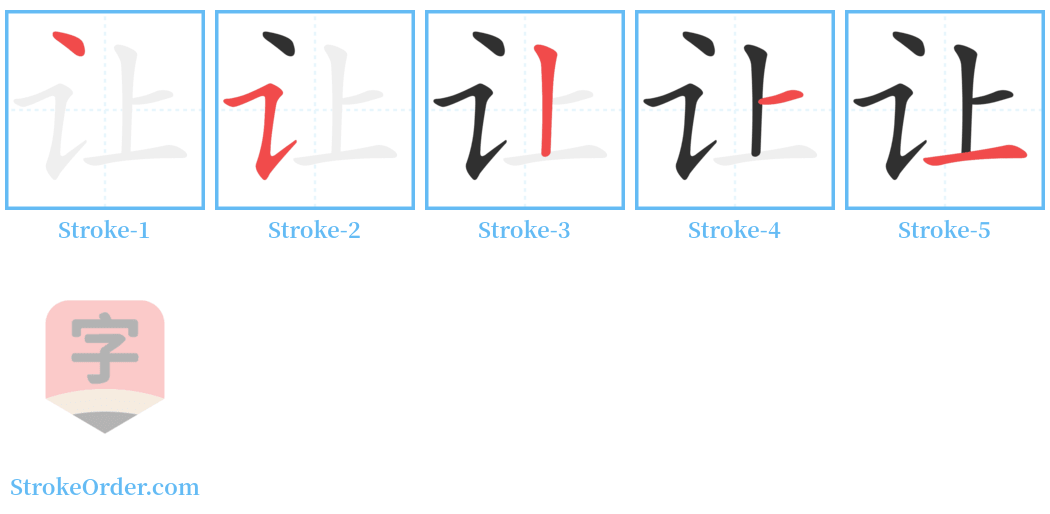让 Stroke Order
Animated Stroke Order of 让

Stroke Order Diagrams for 让

Step-by-Step Handwriting Guide for 让

Learn to Write Chinese Characters with Video Tutorials
Watch the video of writing the Chinese character "让", learn the correct stroke order (笔顺) of the character "让", and master the standard way of writing the character "让".
Free Printable Handwriting Practice with Stroke Order: 让
Printable Writing Practice Worksheet of "让" in Portrait Orientation (Tian Zi Ge)

Printable Writing Practice Worksheet of "让" in Landscape Orientation (Tian Zi Ge)

Information of 让
Pinyin
ràng
Radical
讠
Strokes
5 strokes
Usage
★★★★★
Definition
to ask / to let / permit / have (someone do something) / to yield / to allow
让
ràng
1. 不争,尽着旁人。
To not compete, to yield to others.
2. 请。
To invite.
3. 许,使。
To permit; to allow.
4. 任凭。
To let go; to allow.
5. 被。
To be subjected to.
6. 索取一定代价,把东西给人。
To transfer ownership to others at a specified cost.
7. 闪避。
To dodge.
8. 责备,谴责。
To blame; to reprimand.
9. 古同“攘”,侵夺。
An ancient term synonymous with "to seize" or "to pillage."
让
ràng
1. 同本义 ([En.] blame)
Same as the original meaning (blame).
引:
1. 《说文》:让,相责让也。
"Shuo Wen": "Let" means to reprimand and yield.
2. 《小尔雅》:诘责以辞谓之让。
"Xiao Er Ya": To reprimand with words is called yielding.
3. 《广雅》:让,责也。
"Guang Ya": "Let" means to blame.
4. 《左传·昭公二十五年》:且让之。
"Zuo Zhuan": And let it be.
5. 《国语·周语》:让不贡。
"Guo Yu": Yielding does not contribute.
例:
又如:让书(有责备言语的书信);让勖(既责备又勉励);让诮(责让讥诮)
For instance: reproach letters (letters with blame); to admonish (to both scold and encourage); to blame while mocking.
2. 退让;谦让 ([En.] give away; give ground; modestly decline)
To yield; to modestly decline.
引:
1. 《左传·襄公十三年》:让者,礼之主也。
"Zuo Zhuan": A person who yields is the master of propriety.
2. 《国语·周语》:让文之材也。
"Guo Yu": Wisdom of yielding is a virtue.
例:
又如:让梨觅枣(比喻兄弟间的手足情爱);见困难就上,见荣誉就让;各不相让;寸步不让;让棋;让衢(让路);让再让三(三番五次地推让);让客(礼让客人);让德(谦让的品德)
For example: sharing food with siblings reflecting brotherly love; stepping up to challenges while yielding to praise; neither yielding; firmly standing one's ground; yielding in chess; yielding the path; repeatedly yielding; respecting guests; virtue of modesty.
3. 推举 ([En.] elect)
To recommend or elect.
引:
1. 歌哥三打祝家庄身亡之后,众兄弟让我为头领。—— 李致远《还牢末》楔子
"After the elder brother died at Zhujiacun, all the younger brothers elected me as their leader." - Li Zhi Yuan.
4. 以一定代价将东西的所有权转给他人 ([En.] let sb. have sth. at a fair price; make over)
To transfer ownership of items to others for a specified price.
引:
1. 《儿女英雄传》:把房子让给远房几家族人来住。
"Children of Heroes": To let relatives live in the house.
2. 《红楼梦》:薛家伏势倚情,偏不相让。
"Dream of the Red Chamber": The Xue family relied on their influence, showing no willingness to yield.
例:
又如:让与(把财物或权利移转于别人);让禄(把利禄移转给别人);让国(把国君的地位让给他人);让名(把名誉让给他人);让价;让利销售
For example: to bestow (to transfer property or rights); to transfer benefits; to abdicate (give up ruling position); to concede fame; price discounting; sharing profits in sales.
5. 请,邀请 ([En.] invite; usher)
To request or invite.
例:
如:把他让进门来;把客人让进里屋
For instance: letting him in the door; allowing the guest into the inner room.
6. 允许 ([En.] let; allow; permit)
To permit or allow.
例:
如:公共场所不让吸烟;让他走了
For instance: No smoking is allowed in public places; letting him leave.
7. 通“攘”。推辞;推让;拒绝 ([En.] decline; refuse)
To decline or refuse.
引:
1. 《潜夫论·明闇》:乃惧距天用而让有用也。
"Qian Fu Lun": Fearing to stray from rectitude leads to yielding useful values.
例:
又如:让职(辞让官职);让爵(让爵位)
For instance: to decline a post; to renounce a title.
8. 要求 ([En.] ask)
To request or demand.
例:
如:是他让我来的;她妈妈让她每天练钢琴八个小时
For instance: It was he who asked me to come; her mother requires her to practice piano for eight hours every day.
9. 躲避,避免碰到(如突然转身) ([En.] dodge)
To evade or avoid.
例:
如:幸亏我让得快,要不早给那辆车撞倒了;让威(避开敌人的锋芒);让开(避开);让辟(退让避开)
For instance: Luckily, I dodged quickly; else that vehicle would have hit me; to avoid the enemy's sharpness; to step aside.
10. 用烟酒款待 ([En.] entertain; treat; offer)
To provide hospitality with food and drink.
例:
如:让酒(请人喝酒);让烟(请人抽烟);让坐(请客人入座)
For example: inviting someone for drinks; offering cigarettes; seating guests.
12. 窃夺 ([En.] steal)
To steal or seize.
引:
1. 《管子·君臣下》:治斧钺者,不敢让刑;治轩冕者,不敢让赏。
"Guanzi": Those who govern axes and handcuffs dare not yield punishment; those who manage crowns and rewards do not dare to yield favor.
13. 骚扰 ([En.] disturb)
To disturb or disrupt.
引:
1. 《荀子·荣辱》:巨涂则让,小涂则殆。
"Xunzi": In great turmoil, you yield; in minor troubles, you are harmed.
让
ràng
介词 (Preposition): 被 【英】:by.
By.
例:
如:他让自行车撞了;庄稼让大水冲走了
For example: He was hit by the bicycle; crops were washed away by the flood.
让
ràng
名词 (Noun): 古代的一种礼节仪式。举手平衡状 【英】:put up one's hands to balance.
An ancient ritual gesture of raising hands for balance.
引:
1. 《仪礼·聘礼》:宾入门皇,升堂让。 郑玄注:“讓谓举手平衡也。”
"Yili": When guests enter, they raise hands for balance. Zheng Xuan noted: "Let" refers to raising hands for balance.
2. 《史记·项羽本纪》:大行不顾细谨,大礼不辞小让。
"Records of the Grand Historian": Great undertakings do not concern themselves too much with minor details or trivial yielding.
surrender sth. submissively / give up sth. to others without putting up a fight / hand over on a platter / hand over with a bow / hand sth. over on a silver platter
Input Method for 让
Pinyin
rang4
Wubi
yhg
Cangjie
ivym
Zhengma
sia
Four Corner
31710
Unicode
U+8ba9